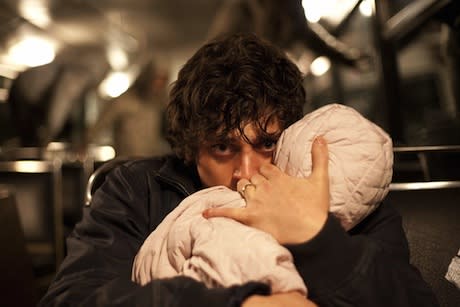What Ciaran Foy's claustrophobic psychological thriller, Citadel, excels in is understanding the nature of victimhood and social anxiety. Widowed father Tommy (Aneurin Barnard) struggles to leave his apartment after his pregnant wife is brutally beaten and stabbed in the stomach with a syringe while he's forced to watch. Her resulting demise from an unknown infection leaves him attempting to care for his infant while simultaneously struggling to look after himself, going to support groups with other victims and trying to mask his tendency to present an easy target for those inclined to attack. Foy's depiction of the world in Citadel is bleak, washed-out and post-apocalyptic. Tommy's apartment is as barren as the streets around him, where hooded youths hide in the shadows planning to steal his baby. Suffice it to say, this world is indicative of the inner-perception of our protagonist, whose disposition is inherently misanthropic. The level of detail and hyper-realized terror surrounding Tommy's condition is quite cerebral, which is why it's no surprise when Foy discusses his struggles with agoraphobia after suffering a violent attack on the sole "Making of" supplement included with the DVD. He understands the terror and rage of someone coping with a fear of what is ostensibly the world and the unpredictability of human behaviour. Similarly, he discusses the creation of an isolated, abandoned environment to reflect a psychological state. But beyond just capturing the emotional component of a character journey, Foy has packed his story with an anarchic sensibility that maintains tension and an ominous tone throughout. We never know where the attacks will come from; we just know that these hooded villains — all of whom reside in public housing, suggesting cyclic systems of violence in low income neighbourhoods — are lurking in every shadow, ready to attack when they sense fear. And beyond the horrific aspect of the film and intelligent handling of character, the weirdly cynical and practical application of vengeance to the narrative when a renegade priest (James Cosmo) offers to help Tommy kill the gang of interchangeable youths works as a not-so-subtle "fuck you" to politically correct idealism. As such, Foy's low-key horror film manages to shock, terrify and develop pathos without leaving its brains at the door, which is an impressive feat.
(Mongrel Media)Citadel
Ciaran Foy

BY Robert BellPublished Feb 28, 2013



